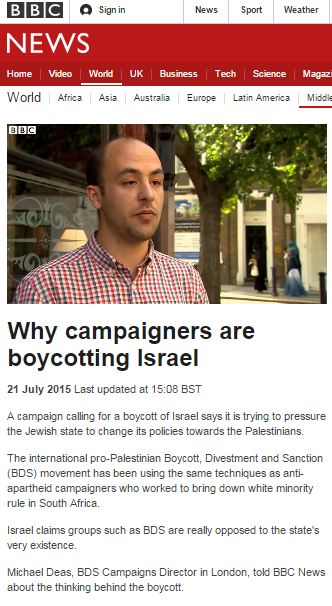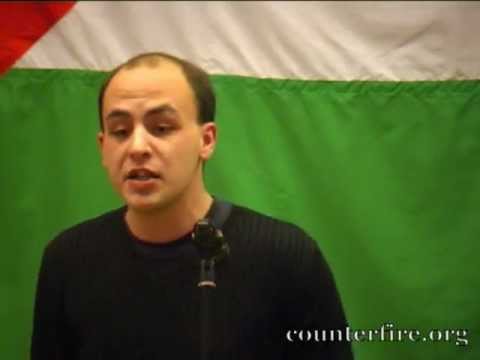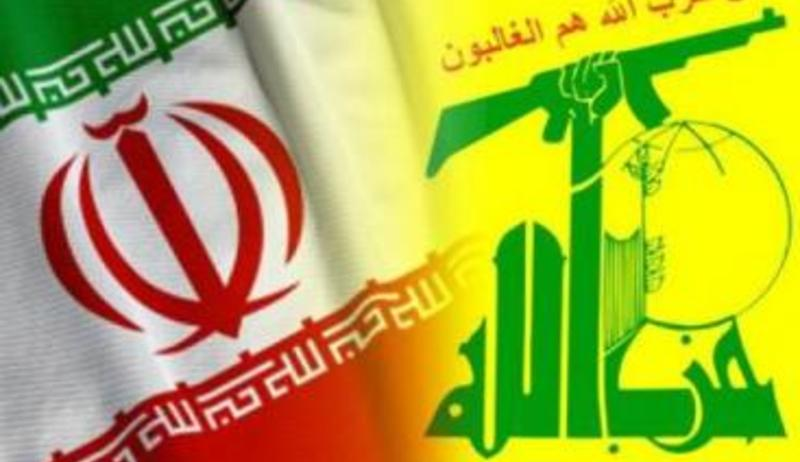As has been documented many times on these pages, whilst the BBC often provides a platform for proponents of BDS (Boycott, Divestment and Sanctions) against Israel and no less frequently some of its own journalists can also be found amplifying and mainstreaming that campaign, the corporation consistently fails to provide its audiences with the full facts about the aims and motivations of BDS.
The latest examples of that ongoing practice were to be found on multiple BBC platforms between July 21st and 23rd.
Viewers of BBC television news programmes saw a filmed item which was also placed on the BBC News website on July 21st under the title “Why campaigners are boycotting Israel” with the following synopsis:
“A campaign calling for a boycott of Israel says it is trying to pressure the Jewish state to change its policies towards the Palestinians.
The international pro-Palestinian Boycott, Divestment and Sanction (BDS) movement has been using the same techniques as anti-apartheid campaigners who worked to bring down white minority rule in South Africa.
Israel claims groups such as BDS are really opposed to the state’s very existence.
Michael Deas, BDS Campaigns Director in London, told BBC News about the thinking behind the boycott.”
And indeed, viewers heard the following unchallenged monologue from professional activist and former LSE student Michael Deas:
“The international community consistently fails to hold Israel to account for its violations of international law. So given this failure, ten years ago – in July 2005 – Palestinian organisations came together to issue an appeal for a campaign of boycotts, divestment and sanctions similar to the boycott campaign that helped end apartheid in South Africa. And the boycott calls for non-violent pressure against Israel until it complies with international law.
The Palestinian call for a boycott of Israel is for a boycott of all Israeli products. Now we know that some people and some organisations are really at the moment only comfortable boycotting products that come from settlements and that’s a position that we understand and can sympathise with. The problem is is [sic] the Israeli export companies that are exporting oranges and avocados, they routinely lie about where their products are coming from so the only safe way for people to avoid buying products from the settlements is not to buy Israeli products altogether.”
A more one-sided promotion of BDS than that is difficult to imagine but nevertheless, the supposedly ‘impartial’ BBC did not see fit to provide viewers of this clip with the range of relevant information concerning the organization Deas represents.
Who funds the Palestinian BDS National Committee as it is correctly known and who are its members? What are its aims? Why does it oppose ‘normalisation’ with Israel and Israelis? What does its demand for the ‘right of return’ for Palestinian refugees to Israel say about its stance regarding a negotiated two-state solution to the conflict and does the BDS movement recognize Israel’s right to exist and the Jewish people’s right to self-determination?
None of the answers to those questions were provided to audiences viewing this BBC facilitated exercise in delegtimisation and – despite what the BBC appears to think – inclusion of the bizarrely phrased sentence “Israel claims groups such as BDS are really opposed to the state’s very existence” in the synopsis to this clip does not meet the requirement for impartial presentation of the movement’s political aims and even suggests that the BBC does not understand the structure of the campaign.
Neither were viewers informed that Deas’ portrayal of the BDS campaign’s beginnings is inaccurate and that in fact its roots are to be found in the 2001 Durban conference, as documented by Dan Diker.
“The 2001 UN World Conference against Racism in Durban, South Africa, has become recognized as a seminal event in the current global BDS campaign against Israel. Governments and NGOs from around the world convened for the formal Durban Conference and its parallel NGO Forum from August 30 to September 8, 2001. The PLO delegation led by the PLO’s UN representative, Nasser al-Kidwa, together with other member countries of the Organization of the Islamic Conference and Western NGOs, played a central role in formulating what was called the final NGO declaration.
Human rights NGOs, with input from Arab states and Iran, ensured that the NGO Forum included a final declaration that read:
[We] [c]all upon the international community to impose a policy of complete and total isolation of Israel as an apartheid state as in the case of South Africa which means the imposition of mandatory and comprehensive sanctions and embargoes, the full cessation of all links (diplomatic, economic, social, aid, military cooperation and training) between all states and Israel.
Durban represented a watershed moment for anti-Israel radicalism. It was no irony that the above calls to criminalize and isolate Israel were accompanied by terror attacks by Palestinian terror organizations. On September 9, the day after Durban ended, a Hamas suicide bomber killed three people at the Nahariya train station in northern Israel. Durban’s radical likening of Israel to apartheid South Africa would help create international legitimacy for violence, or what both Fatah and Hamas call “resistance” against the “illegitimate” Jewish state, which set a precedent for future calls for its dismantling and actions to achieve that goal.
To that end, the Durban Conference’s NGO declaration would establish the political and ideological infrastructure for the contemporary BDS movement: economic boycotts, government sanctions, and the severing of social and cultural links with Israel were all key areas of focus.”
The BBC did not however limit its promotion of Michael Deas and his cause to this filmed item – as we shall see in part two of this post.





